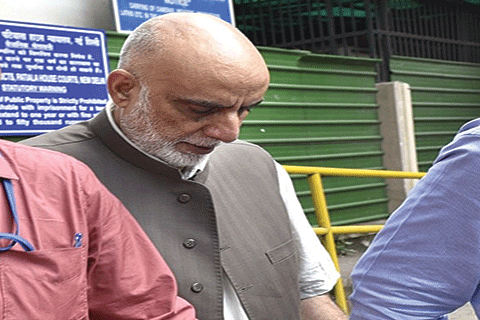The Delhi High Court on Thursday granted bail to prominent Kashmiri businessman Zahoor Watali, one of the accused in the J&K funding case, a year after his arrest by the National Investigation Agency, even as the court observed that the All Parties Hurriyat Conference was not a banned outfit under the Unlawful Activities Prevention Act.
A division bench of Justice Muralidhar and Justice Vinod Goel, after hearing the counsel for Watali and special public prosecutor for the NIA, granted bail to Watali while holding that no prima-facie case was made out against the accused. Through his counsel Shariq Reyaz, Watali had challenged before the Delhi High Court an order of a trial court on June 8 that had rejected his bail plea.
Besides the personal bail bond of Rs two lakh, Watali has to furnish two sureties of the same amount and also submit his passport.
Watali has been lodged in New Delhi’s Tihar jail since his arrest in August 2017 in connection with the case filed by the NIA into the alleged funding of “militant and separatist activities” in Jammu and Kashmir. He was charge-sheeted on January 18 along with Hafiz Saeed, Syed Salahuddin, seven Kashmiri separatist leaders and others, for allegedly hatching a conspiracy to “wage a war” against India.
In its 40-page judgment, the division bench has held that no material was brought on record by the NIA to even prima-facie prove that the allegations against Watali were true.
Watali’s counsel Reyaz stated that the High Court has ventured meticulously into the merit of the matter and has “returned an emphatic decision that no cogent material existed to even prima-facie prove the allegations leveled against his client by the NIA.”
Calling it an “emphatic victory” and quoting from the judgment, Reyaz said that the High Court in unequivocal terms has observed that “…the appellant (Watali) is a leading businessman in Kashmir. He runs a conglomerate of business entities and has been active in the context of Indo-Pak trade. Nothing has been shown to this court from the entire bunch of documents that would suggest that these trade activities were geared toward funding of militant activities, as alleged in the charge-sheet.”
Noting that the NIA lacks evidence to establish the Pakistan high commission’s role in the alleged funding case, the Delhi High Court further observed that the separatist organisation All Parties Hurriyat Conference was not a banned outfit under the Unlawful Activities Prevention Act (UAPA). The court noted in its order that “it has emerged during the course of the hearing” of the case that neither the APHC nor any of its 26 constituent organisations are banned “within the meaning of the UAPA.”
The investigating agency had raided Watali’s premises and claimed to have found “highly incriminating material pertaining to the receipt of funds by Watali from foreign sources, and its further distribution to militants and separatists in Kashmir for anti-India activities.”
Those arrested by NIA last year in the alleged funding case include top separatist leader Shabir Shah, Aftab Hilali Shah alias Shahid-ul-Islam, Ayaz Akbar Khanday, Farooq Ahmad Dar alias Bitta Karate, Nayeem Ahmad Khan, Altaf Ahmad Shah, Raja Mehrajuddin Kalwal and Bashir Ahmad Bhat alias Peer Saifullah. Altaf Ahmad Shah is the son-in-law of Hurriyat Conference (G) chairman Syed Ali Geelani, while Shahid-ul-Islam is an aide of Hurriyat (M) chairman Mirwaiz Umar Farooq. Khanday is the spokesperson for Geelani-led Hurriyat.
During the course of its probe, the NIA had claimed that Syed Shahid Yousuf, the son of United Jehad Council chairman Syed Salahuddin, had admitted to receiving funds from his father, “to foment militant activities in Kashmir.” The Delhi High Court later dismissed the bail plea filed Yousuf, the seventh accused against whom a charge-sheet had been filed in the case.






